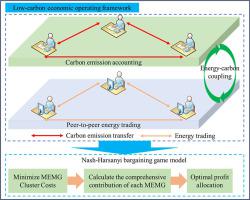Sustainable Cities and Society ( IF 10.5 ) Pub Date : 2023-10-06 , DOI: 10.1016/j.scs.2023.104987 Sen Zhang , Weihao Hu , Xilin Cao , Jialin Du , Chunguang Bai , Wen Liu , Ming Tang , Wei Zhan , Zhe Chen

|
Peer-to-peer energy trading among multi-energy microgrids is a promising pathway to improve energy efficiency, reduce carbon emissions, combat climate change, and promote sustainable development. This study proposes a multi-energy trading strategy for multi-energy microgrids that considers carbon tax policies to boost the low-carbon management of multi-energy microgrid clusters. First, a carbon emission accounting model with energy-carbon coupling is constructed to clarify the carbon emission transfer generated by energy transactions among multiple agents and to achieve accurate accounting of carbon emissions from each multi-energy microgrid. Second, the Nash-Harsanyi bargaining game theory is used to establish an energy trading alliance for multi-energy microgrid clusters. A profit allocation mechanism is designed to reflect the marginal contribution of each player to the economic and environmental effectiveness of the alliance. Finally, different carbon emission accounting methods and profit allocation mechanisms are compared. The simulation results demonstrate the effectiveness of the carbon emissions accounting model and the proposed energy trading strategy. The low-carbon scheduling framework among the multi-energy microgrids generated an economic gain of $ 1376.44 and 12.60 t carbon savings.
中文翻译:

考虑碳排放核算和利润分配的互联多能源微电网低碳经济调度策略
多能源微电网之间的点对点能源交易是提高能源效率、减少碳排放、应对气候变化和促进可持续发展的一条有前途的途径。本研究提出了多能源微电网的多能源交易策略,考虑碳税政策来促进多能源微电网集群的低碳管理。首先,构建能源-碳耦合的碳排放核算模型,明确多主体间能源交易产生的碳排放转移,实现各多能源微网碳排放的准确核算。其次,利用Nash-Harsanyi讨价还价博弈理论建立多能源微电网集群的能源交易联盟。利润分配机制旨在反映每个参与者对联盟经济和环境效益的边际贡献。最后,比较了不同的碳排放核算方法和利润分配机制。模拟结果证明了碳排放核算模型和所提出的能源交易策略的有效性。多能源微电网之间的低碳调度框架产生了1376.44美元的经济收益和12.60吨的碳减排。

































 京公网安备 11010802027423号
京公网安备 11010802027423号